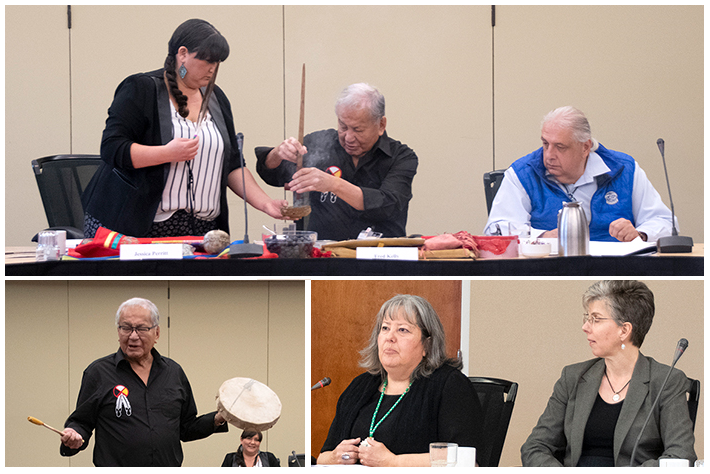For the second year, the Nuclear Waste Management Organization (NWMO) held a workshop to bring together scientists and Indigenous Knowledge keepers.
Indigenous Elders and potential siting area community members, advisors to the NWMO, experts in traditional knowledge, NWMO leaders and staff, and professors from Canadian and international universities attended the two-day workshop in King City, Ont.
“For this workshop, we decided to focus on bridging the gap that exists among western scientists regarding Indigenous Knowledge,” said Bob Watts, Vice-President of Indigenous Relations at the NWMO. “We want to put in place the foundational knowledge needed to look at ideas for collaboration around Canada’s plan for used nuclear fuel.”
Members of the NWMO Council of Elders and Youth opened the workshop: Elder Fred Kelly performed a Pipe Ceremony, Brandon Petahtegoose continued with a drum song to honour the pipe and guidance it would bring to the meeting, and Elder Billie Schibler added prayers to honour the waters on Mother Earth.
The sessions that followed were both immersive and participatory. Topics included understanding the Indigenous world view, Indigenous teachings about water, and the agency of Mother Earth and the stewardship role of Indigenous women.
Lyndon J. Linklater, a traditional knowledge keeper, shared Muskeg tea, an Indigenous medicine. While the group sipped on their tea in a circle, he told stories and shared various aspects of Indigenous world view, traditional values and kinship structures.
Describing the Elders as “our Google,” Mr. Linklater explained that Indigenous peoples seek guidance from the wisdom of Elders, and knowledge is rooted in an oral tradition. He encouraged the group to consider communicating about the project in a way that will resonate with Indigenous peoples.
“My hope is to create a dialogue between western scientists and Elders, today and in the future,” Mr. Linklater said.
During a presentation about Mother Earth, Elder Diane Longboat introduced the concept of the “Soul of Science,” which includes natural laws such as connection to spirit for guidance, taking only what you need from the land and water, and not wasting resources. She highlighted the NWMO’s borehole drilling as an example of integrating this approach into scientific work.
“During my visit to the borehole site in the Wabigoon Lake area, I saw the care and respect that was taken with the land and also that the NWMO created a space on the land for offerings and ceremony,” Elder Longboat explained.
Derek Wilson, Chief Engineer and Vice-President of Contract Management at the NWMO, confirmed the importance of interweaving Indigenous Knowledge. “We are going down a path together, and it is important to consider different world views and how aspects of the Indigenous Knowledge system can inform our project moving forward.”
The workshop will have an effect even after its conclusion. Workshop participant Jamie Noel, a corrosion scientist and assistant professor at the University of Western Ontario, plans to share his learning with his students, who may eventually work on the Adaptive Phased Management project or other large infrastructure projects. “Being open to different ways of knowing and deepening our understanding will benefit everyone,” he said.

